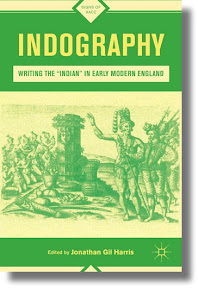Indography
Harris, Jonathan Gil [Hrsg.]:
Indography : writing the 'Indian' in early modern England / edited by Jonathan Gil Harris. - Basingstoke ; New York : Palgrave Macmillan, 2012. - vi, 271 S. - (Signs of Race)
ISBN 978-0-230-34137-1
£ 60,00 / US$ 90,00
DDC: 820.9352997
Beschreibung
In the fifteenth and sixteenth centuries, Europeans invented 'Indians' and populated the world with them. The global history of the term 'Indian' remains largely unwritten and this volume, taking its cue from Shakespeare, asks us to consider the proximities and distances between various early modern discourses of the Indian. Through new analysis of English travel writing, medical treatises, literature, and drama, contributors seek not just to recover unexpected counter-histories but to put pressure on the ways in which we understand race, foreign bodies, and identity in a globalizing age that has still not shed deeply ingrained imperialist habits of marking difference. [Verlagsinformation]
Herausgeber
JONATHAN GIL HARRIS Professor and director of the Graduate Studies Department of English at George Washington University, USA. He is the author of Foreign Bodies and the Body Politic: Discourses of Social Pathology in Early Modern England; Sick Economies: Drama, Mercantilism and Disease; Untimely Matter in the Time of Shakespeare; Shakespeare and Literary Theory; and Marvellous Repossessions: The Tempest, Globalization, and the Waking Dream of Paradise. He is the editor, with Natasha Korda, of Staged Properties in Early Modern English Drama, and the editor of the 3rd New Mermaids edition of Thomas Dekker's The Shoemaker's Holiday. He is also associate editor of Shakespeare Quarterly. Profile page.
Quellen: Palgrave; Macmillan; WorldCat; Amazon (UK)
Harris: Indography, 2012
Ähnlich
- Reading the Animal in the Literature of the British Raj
- Colonial Voices
- The Stillbirth of Capital
- Sympathy and India in British literature
- The Postcolonial Indian Novel in English
- Indian Angles
- Dawson Varughese: Reading New India
- Brinks: Anglophone Indian Women Writers
- Shingavi:The Mahatma Misunderstood
- Making British Indian Fictions

